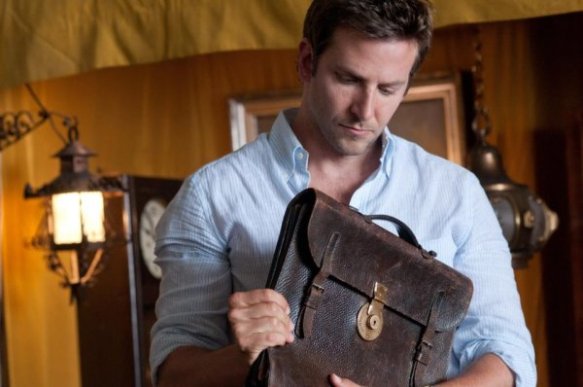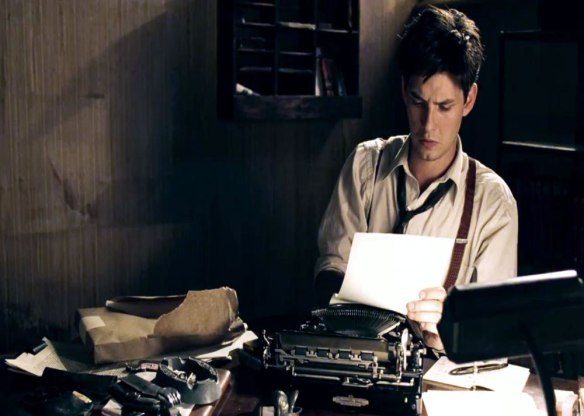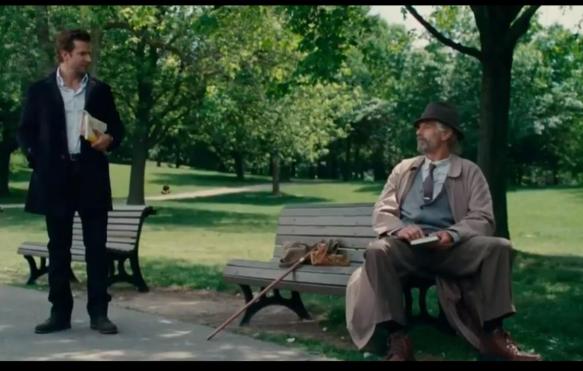This was a layered tale about writers, aptly named The Words, with an emotional story of the regret and consequences that followed one selfish action. I enjoyed it very much, and I think it does a good job of portraying the long-lasting repercussions a bad decision can have. (Warning: The rest of this post contains **SPOILERS**).
Clay Hammond (Dennis Quaid) is an accomplished author reading excerpts at the launch of his new book, which is the tale aspiring novelist Rory, (Bradley Cooper). Rory has been unable to get anything published, has had to stop writing full-time and get a job, (because his father refused to keep lending him money),and then finds a typed manuscript by chance, hidden in an old briefcase. The manuscript is a masterpiece, and adds to Rory’s depression. “In those words, he had been confronted by everything he had ever aspired to be, and the reality of what he would never become,” intones the narrator. Later, an upset Rory yells at his wife, “I’m not who I thought I was. And I’m terrified that I never will be.” Surely many viewers can sympathize with Rory’s feelings of inadequacy.

“He didn’t know why he was doing it; he just wanted to feel the words pass through his fingers, through his mind.”
Rory doesn’t initially set out to actively steal the manuscript. But he re-types it, word for word, onto his computer. When his wife (Zoe Saldana) finds the document, her glowing praises are, unknown to her, heartbreaking; she says it’s “so much better than anything you’ve ever written before!” It would be painful, but this is the moment for Rory to admit that the words are not his. Another moment would be when he submits the manuscript to a publisher, or before he signs a deal with a literary agent. Clay narrates that Rory goes along with the assumption that he wrote it without protest because, “There was no epiphany, no sign from the gods to point him in the right direction,” but this is a refusal to take responsibility. He could have told the truth at any point, and when he signed the publication deal, “Rory Jansen had made his choice.”
It’s true that there are rarely blaring epiphanies from God telling us what to do, but that doesn’t mean we can’t discern what His will is in any given situation. There are no verses to tell Rory, “thou shalt not steal credit for a manuscript thou didst not write,” but there is just plain “You shall not steal,” Deuteronomy 5:19. (The 8th of the 10 commandments, for you trivia buffs.) Even if Rory isn’t sure whether this act would constitute “stealing,” there’s 1 Corinthians 10:31,
“So whether you eat or drink or whatever you do, do it all for the glory of God.”
There’s Proverbs 3:5-6,
“Trust in the LORD with all your heart and lean not on your own understanding; in all your ways acknowledge him, and he will make your paths straight.”
Knowing whether something is right or wrong isn’t so much about memorize Bible verses on what’s forbidden as it is about looking at the situation from the perspective, what will honor and glorify God? What does He want me to do? Does what I am considering fit within the boundaries of scripture? God’s probably not going to answer with a vision or sudden inspiration, but if Rory had honestly asked himself whether he ought to take credit for writing this book or not, he should have seen clearly that the answer was no.
Instead, Rory does a lot of justification for his selfishness after the fact, which crumbles when he’s forced to confront the reality of what he’s done–I imagine that scene between the Old Man (who actually wrote the book) and Rory in the park, when the old man says “No no, my friend, there’s no misunderstanding, no. You can’t slide out of it now. Those are my words, my stories,” is a little like what God’s judgment will be like; all the lies people have told themselves about their actions, all the ways they’ve tried to justify things that they did wrong, completely falling apart when God looks them in the eyes and says, “I know what really happened. You can’t slide out of it now.” (And then, if they claim it, Jesus’ blood will atone for the sins they could never wipe clean on their own.)
Needless to say, Rory’s ill-gained charmed life crumbles in the wake of this confrontation. The Old Man refuses to forgive Rory, rebuffing the thieving author’s attempts to “fix this” with, “There’s nothing to fix. You just go like the life you’ve chose.” And, “You can’t make things right, things are just things. No matter how hard you try to martyr yourself.” Although he’s a victim in this, he doesn’t gain anything by clinging to anger; in a way he is twice a victim, both to Rory’s theft and to the the self-inflicted bitterness that he daily poisons his life with over it.

Ben Barnes (who played Prince Caspian in the recent live-action Narnia films) is excellent as the young version of the true manuscript author.
The publisher advises Rory not to publicly admit his wrongdoing, saying, “Don’t screw yourself for the rest of your life over one stupid mistake, and don’t you screw me.” This is advice is obviously selfishly motivated, and is also directly contrary to Provers 28:13,
“He who conceals his sins does not prosper, but whoever confesses and renounces them finds mercy.”
And of course, even though he doesn’t publicly admit to stealing the novel, by not doing so Rory has “screwed himself” for the rest of his life–he never reconciles with his wife, and he is consumed by guilt, regret, and self-doubt. Clay says of his “fictional” character Rory, (who by this point is pretty clearly autobiographical), “Maybe he can create, but it doesn’t matter because he’ll never believe it. He’s robbed himself of the chance to find out.”
Ultimately, The Words is a sadly accurate depiction of the truth of Galatians 6:7-8,
“Do not be deceived: God cannot be mocked. A man reaps what he sows. The one who sows to please his sinful nature, from that nature will reap destruction; the one who sows to please the Spirit, from the Spirit will reap eternal life.”
When he decided to take credit for the novel, “Rory Jansen had made his choice,” but he continued making that selfish choice to protect his own ambitions every day for the rest of his life when he did not tell the truth. And a lifetime of sowing deceit and carrying around hidden guilt yields a sad and lonely reward.

